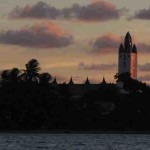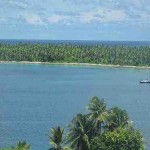We are back on the move again an incredible few days on Nanumea, Tuvalu. From the sea it is harder to miss this atoll – the tower of the church, built in the 1930s, stretches high above the coconut tree line. It is no skyscraper but when you are used to coconut trees, coconut trees, and more coconut trees the building definitely stands out. At first we thought it was a lighthouse of some description, however upon closer inspection we realized the missionaries had left their mark. The island of around 600 people is separated into two villages (north of the church and south of the church). Meetings, dances, and sports are held in the center, immediately adjacent the church, and despite the size of the villages there is a buzz about the place. Kids screamed out, “palangi, palangi,” every time we visited the village, wearing huge smiles.
This sense of community ensures that even 280 nautical miles from the capital of Funafuti, (which is 600 nautical miles from Fiji and quite frankly in the middle of nowhere) – life does not really feel primitive or isolated. We wondered exactly this on our trip up from Fiji to Tuvalu. How disconnected do people feel living in a landmass that is separated by so much water? The answer is that they have each other, and for that reason the level of isolation experienced is relatively small. In fact one might feel more isolated alone in a big city, than in this island group surrounded by hundreds of miles of water.
Kivoli, (a lovely guy from Nanumea who we spent time with on the island), recounted a charming story remembering the first time he looked at a map. He said that it was the moment he realized how small Tuvalu was and how far away from everything they were. “Really, Tuvalu is here!” he exclaimed with humour in his voice. It is hard to imagine growing up and not knowing where you are on the map. Similarly, once upon a time the ancient seafarers set off on voyages, and thinking the world was flat, they never knew when they might fall off the edge. Now Confederate is blessed with such things as google imagery and gps, we know and record our latitude and longitude each hour (which right now is around 4 degrees south and incredibly hot). It is hard to figure out how the Polynesians that crossed oceans and settled in these remote Pacific islands managed to navigate. Then again life was different back then, they knew their stars, they looked to the birds to help them find land and the currents filled in the gaps.
Since his early years without maps, Kivoli has traveled the world aboard container boats, training at the Tuvalu maritime school. He had been to more countries than each one of us, after growing up in Nanumea and Nauru. His personality showed this juxtaposition between worldly seafarer and small island upbringing, recounting stories of both fishing knowledge passed down to him from his ancestors, and tales from various ports around the world.
We spent some awesome times with Kivoli, his wife and their grandson. They were extremely hospitable to us always asking us for meals knowing that supplies can be limited on a boat. We dined on fresh fish, chicken curry, chicken black bean, breadfruit chips, pancakes, and so on, at various times in their company.
After three weeks in Tuvalu it was hard to say goodbye. The place gets around 300 tourists per year, yet if it were more accessible we imagine there would be resorts everywhere. Both the lagoons we visited – Funafuti and Nanumea were insanely picturesque, an unbelievable mirage of turquoise goodness. The fish and bird life in Nanumea was better than we have seen anywhere so far. When we went paddle boarding we saw turtles, black tip reef sharks, heaps of fish, stingrays. When we traveled back to the boat at night huge schools of fish surrounded the dinghy jumping out of the water. On our last day, as a gift, we were given one of the 20 yellowfin tuna a local fisherman had caught that morning.
Nanumea has been a highlight – with its high church tower, from the sea it is hard to miss the place, but now that we have left, I fear, we may miss the place.


Leave a Reply